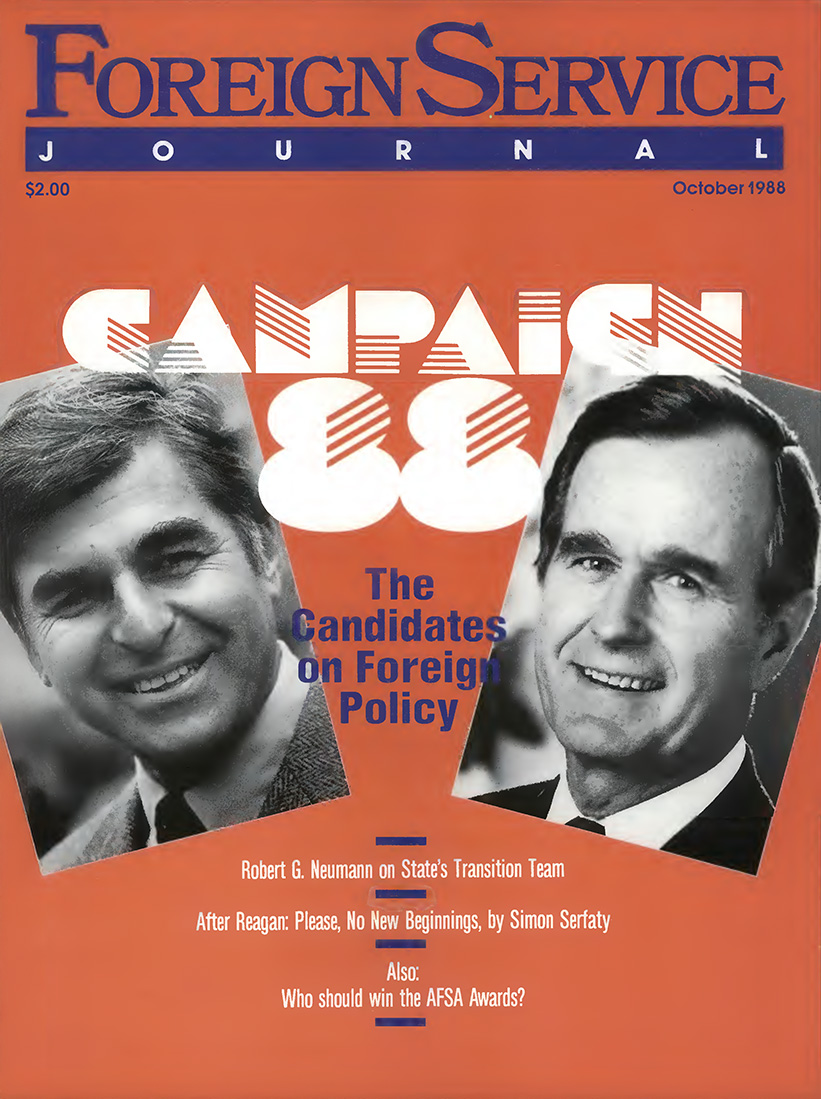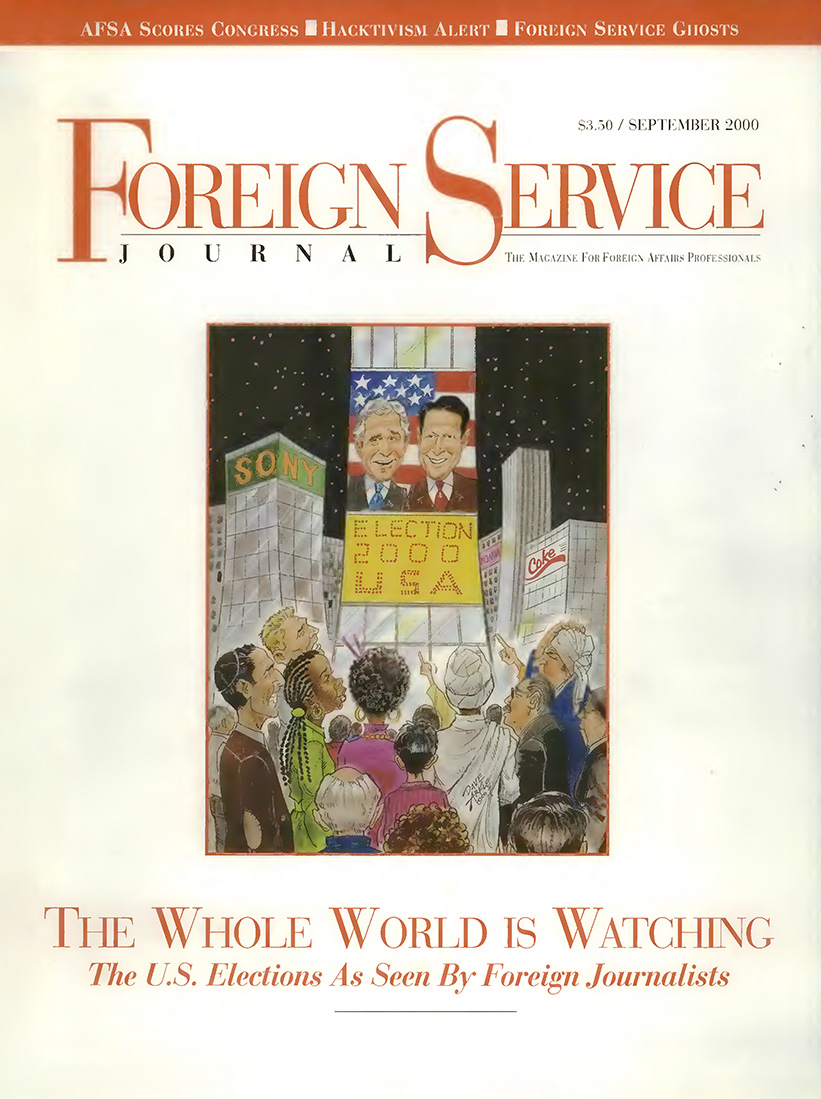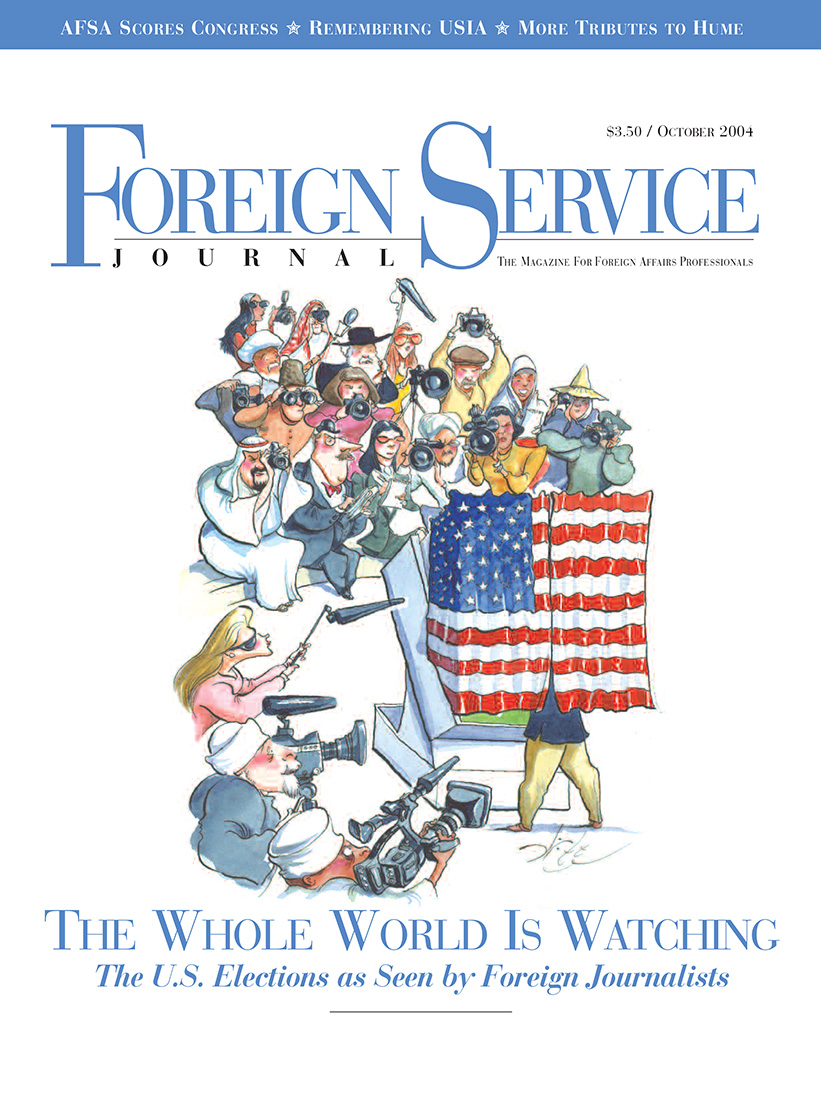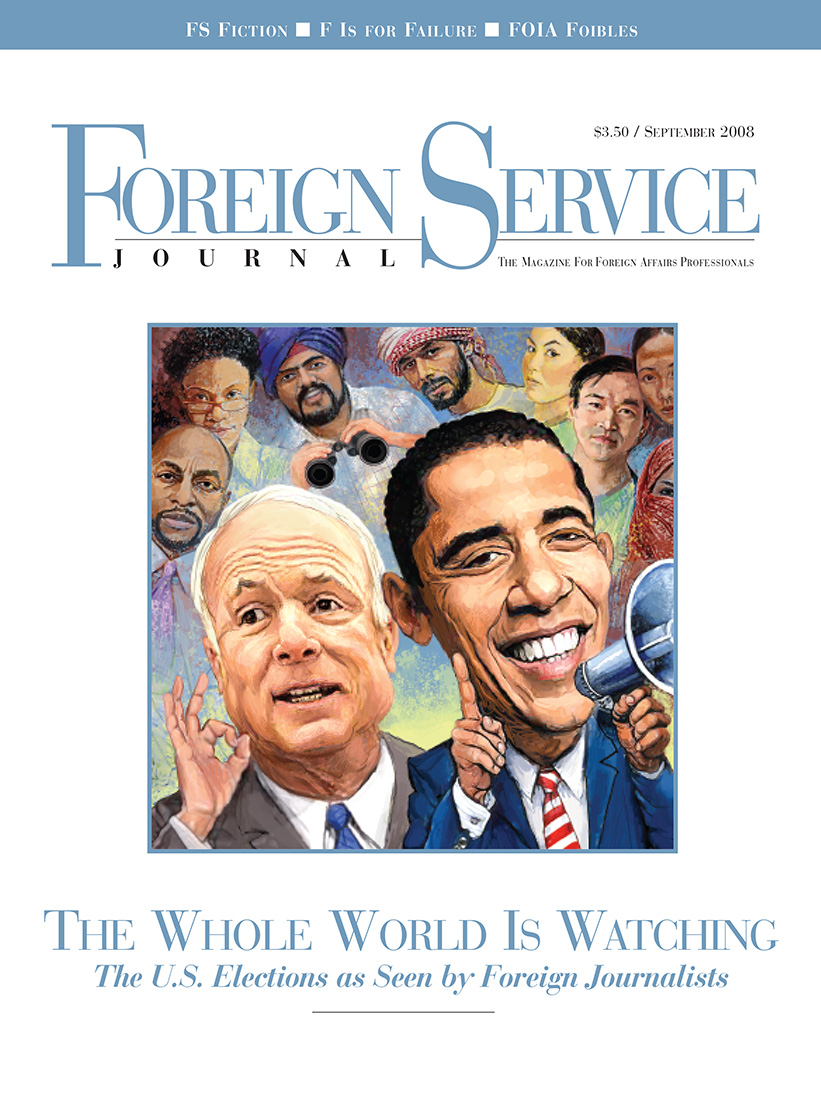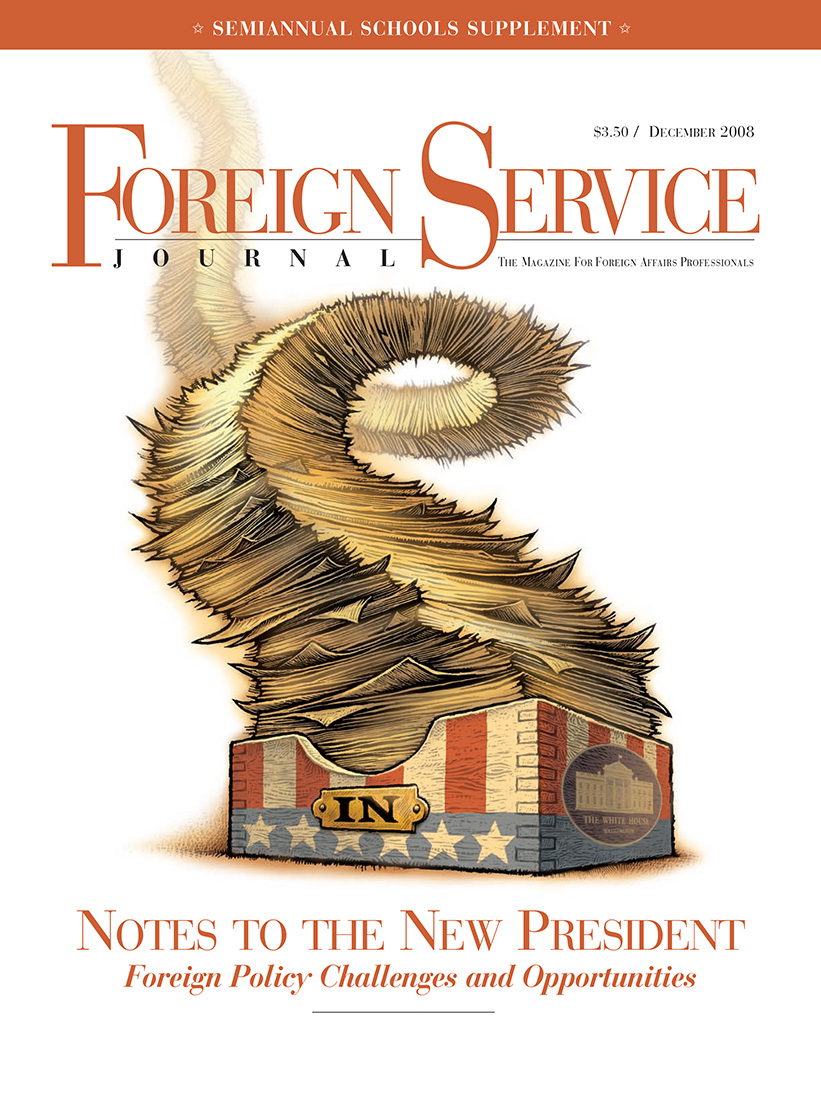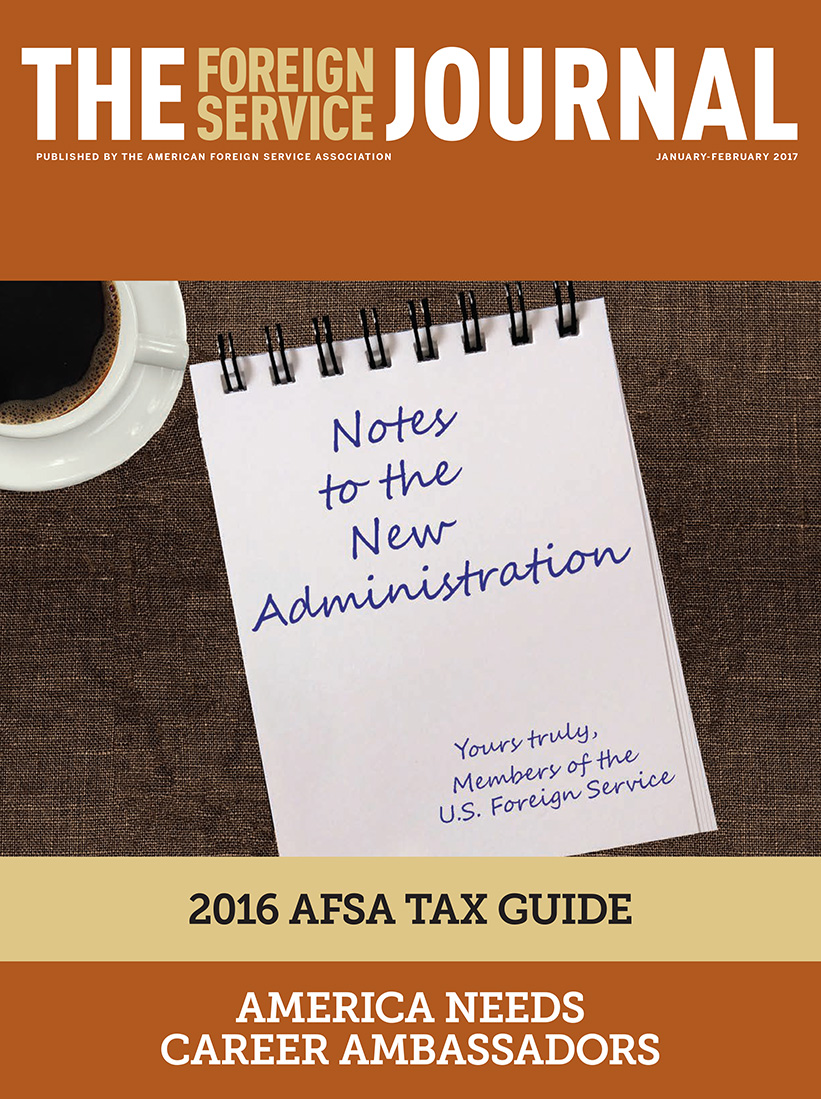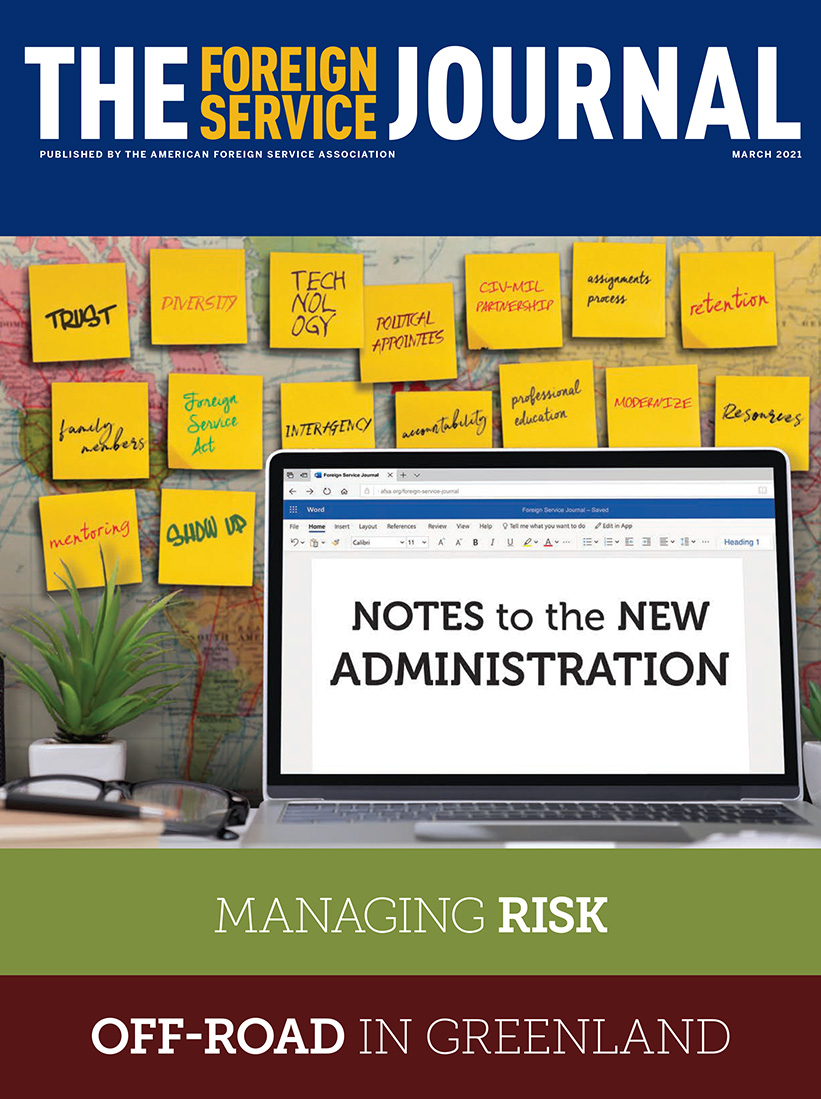From the FSJ Archive: A Look Back—The Foreign Service and Presidential Elections
Exploring the “time capsule” that is the FSJ Digital Archive yields insights into the importance of presidential elections for the U.S. Foreign Service and the Service’s evolving approach to those elections and the administrative transitions that routinely follow.
In the early years, comprehensive notes on the election results were a standard feature in the Journal. By the 1950s, the Journal began focusing on the FS role in facilitating effective foreign affairs transitions. This included educating candidates and engaging the new administration on the purpose and work of the Foreign Service, as well as its particular concerns of the hour—from “Schedule C” in 1960 and political-appointee ambassadors in 1976 to implementation of a new Foreign Service Act in 1980 and staffing shortages in the 2000s.
Not surprisingly, perhaps, since the late 1960s the strictly nonpartisan nature of the Foreign Service has been emphasized. Starting in 2000, the Journal has occasionally presented the views of foreign journalists, for a look at a U.S. election “through their eyes.” More recently, we have sought the views and recommendations of AFSA members for a feature compilation of “Notes to the New Administration.”
—The Editors
1925: CALVIN COOLIDGE TO CALVIN COOLIDGE
“The Presidential Election”
by Gerhard Gade
December 1924, Lead Story
On Nov. 4 the people of the United States elected Calvin Coolidge President by a popular vote estimated at about 18,000,000—2,000,000 more votes than President Harding received in 1920. …
The increase in the vote of 1920 over 1916 was due to the passage of the Woman Suffrage Amendment.
The Republican Party obtained working majorities in both branches of the Sixty-ninth Congress. …
The electorate cast the largest vote in American history—between 30,000,000 and 32,000,000 as compared with 26,675,000 votes in 1920. This record-breaking ballot may be attributed to a number of causes. The organized appeal, made by both Coolidge and Davis as well as by the American Legion to go to the polls as a patriotic duty regardless of partisanship, must have considerably increased the vote. A large number of women who did not avail themselves of the franchise in 1920 doubtless discharged their duty on Nov. 4 after four more years of political education.
The radio for the first time in history had a tremendous effect on the size of the votes by broadcasting political speeches to millions of homes and thus creating a more personal interest in the speakers and the issues of the campaign than was formerly possible through the newspapers alone.
1933: HERBERT HOOVER TO FRANKLIN D. ROOSEVELT
“The Election”
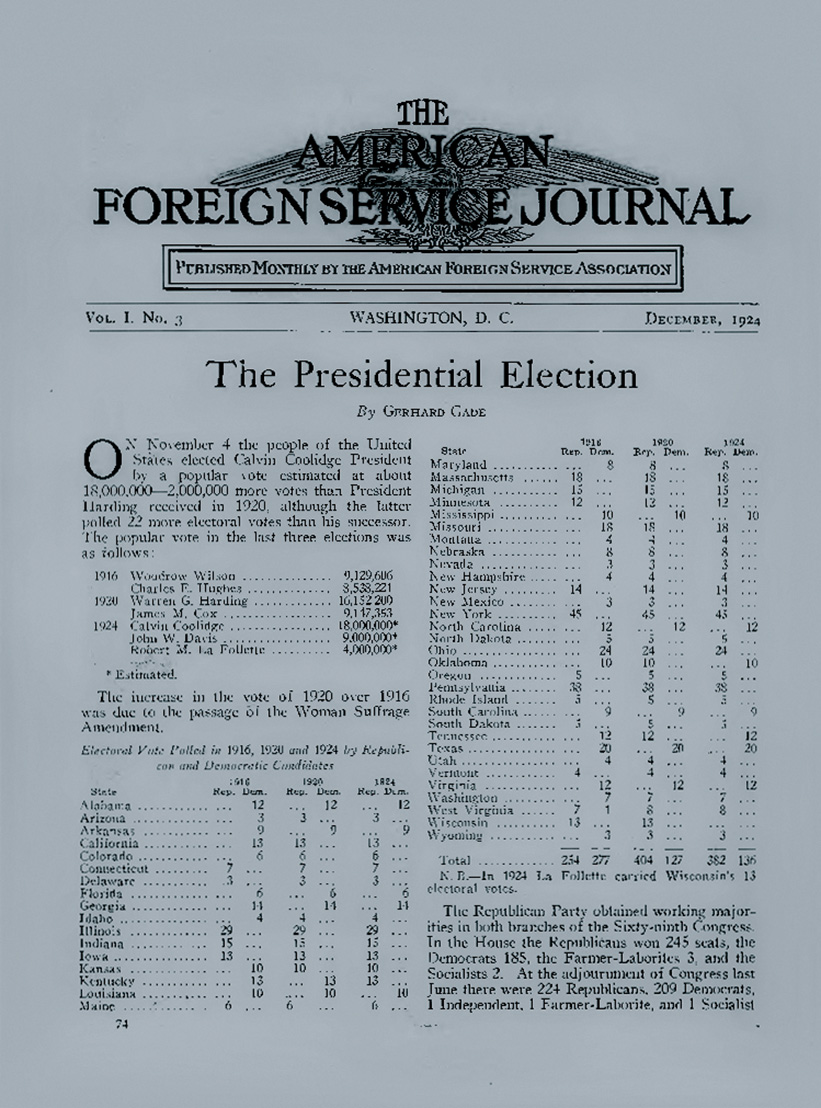
At half-past twelve of the morning of November 9, Governor Roosevelt received the following telegram from President Hoover:
“Hon. Franklin D. Roosevelt,
“Biltmore Hotel, New York City.
“I congratulate you on the opportunity that has come to you to be of service to the country, and I wish for you a most successful administration. In the common purpose of all of us, I shall dedicate myself to every possible helpful effort.” …
The situation in Congress after March 4 will be the most advantageous any President has found in recent years. …
Franklin Delano Roosevelt was 50 years old last January 14. … Since he entered public life 21 years ago, Governor Roosevelt advanced steadily. … Despite the physical handicap, confined to his leg muscles, Mr. Roosevelt has been regarded as one of the hardest working Governors in New York’s history.
It is interesting to note that Mr. Franklin D. Roosevelt, like the late President Theodore Roosevelt [his distant cousin], reached the road to the White House by way of the governorship of New York and the position of Assistant Secretary of the Navy. …
Speculation has been rife as to who will be chosen by Mr. Roosevelt for his Cabinet, but the following recent letter from the President-elect somewhat puts that matter aside for the time being: “In the weeks and months immediately ahead, further unauthorized and unfounded suggestions may appear in print and otherwise. To avoid any misunderstanding, I desire to make it clear that no decision has been reached, and no decision will be reached in regard to any appointments for at least two months.” …
Franklin D. Roosevelt has spent much time traveling in Europe, and speaks French and German fairly fluently. It is therefore said that he possesses an unusually extensive firsthand foreign background.
1949: HARRY S TRUMAN TO HARRY S TRUMAN
“The Election”
As their individual preferences or predictions ran, members of the Foreign Service all over the world reacted like everyone else to President Truman’s upset victory in the election. They gasped or grinned at the discomfiture of the pollsters; their eyes were dewy for Mr. Dewey or triumphant for Mr. Truman. The Hatch Act properly proscribes some kinds of political activity for us Federal bureaucrats; but let us hope no American rule or writ ever keeps us from voting for our choice.
The mighty and processional spectacle of an American presidential election is a thing to marvel at in the world of today. Few people can appreciate this better than those who represent this government abroad, particularly in countries where the secret ballot is a lie or a myth. …
The election meant many things to many people. Whatever else it signified, to most everyone abroad it meant reaffirmation of President Truman’s foreign policy. It is more, not less, to the President’s credit—as well as to the Republicans’—that this is a nonpartisan policy.
Europeans familiar with the vagaries of American diplomacy and Americans who recall our retreat into the shell after World War I could hardly have expected that this country would take the lead in creating an international organization, or that we would launch such an imaginative and audacious project as the European Recovery Plan.
There are many, even among our friends, who might not have credited American policy makers with the ability to recognize the dissembled challenge to the free world in time to do something about it. …
The election returns are in: the returns on this foreign policy are beginning to come in. We think it not premature to congratulate President Truman and Governor Dewey, the Republicans and the Democrats, and our fellow Americans on the election and on the bi-partisan foreign policy.
1953: HARRY S TRUMAN TO DWIGHT D. EISENHOWER
“The Election and the Foreign Service”
As these words are being written, all eyes are turned upon Chicago, where the second of the two great nominating conventions has commenced. This year the prospect of a new administration—whether Democratic or Republican—lends special significance for the Foreign Service to its work.
Removal of the government employee from politics does not at the same time blind him to the phenomenon of a Presidential election, immunize him against personal convictions, or destroy the awareness of his rights and duties as an American citizen. Consequently, the Journal can hardly ignore the activity to which the attention of Americans, wherever they may be, is irresistibly drawn now and until November.
An immediate job of the Foreign Service will be to explain to the people in whose countries we are accredited the amazing machinery of the American presidential election campaign. That should bring out our greatest powers of description, analysis, and interpretation.
As president you will have at your disposal both a highly skilled team of American professionals and a strengthened and enhanced structure for using them. We hope that in filling key foreign affairs positions both overseas and in Washington you will turn first to this powerful resource.
But this is only the immediate job. Out of these conventions come new leaders, new chiefs, and new policies. Whether the victors put the helm to port or starboard, the ship of state in some degree alters course and, perhaps, alters speed as well. The adjustment places added burdens upon those of the crew who remain, including those who have made our foreign affairs their life’s profession.
Upon us in large measure devolves the task of providing background, of outlining present problems, and of applying our knowledge and experience—in short, of providing continuity. As in the past so in the future our new chiefs will, we hope, find us dedicated to the national welfare and ready to serve them as we serve our present chiefs today.
After the election, what should we hope for in any new administration? Surely, understanding of the peculiar nature of the [State] Department’s responsibilities and support of its loyal members at home and abroad. Our ability to perform our duties effectively depends upon the confidence not only of our chiefs but also of the American people. The Journal appreciates the efforts which the present administration has made to sift the truth and combat unfair attacks upon the Service; it hopes for renewed efforts upon the part of a successor administration.
We need to develop further between the American people and the Foreign Service a relationship of mutual knowledge, understanding, confidence and respect. Given the role which our country plays today in world affairs, such a relationship must exist. Without it, the Foreign Service cannot do its job.
1961: DWIGHT D. EISENHOWER TO JOHN F. KENNEDY
“Election Day, 1960”
by Gwen Barrows
December 1960, Washington Letter
To those who sat up all that Tuesday night watching the election returns come in, and there were many, this year’s election will not soon be forgotten. It had all begun easily, with as sunny and mild an Election Day as one could imagine. The voting turnout accordingly was what even seasoned political reporters called fantastically high. … Not until 1 p.m. Wednesday was it announced officially that Senator John F. Kennedy had been elected America’s 35th president. …
Of immediate interest, of course, once the election was determined, was in what direction the “New Frontiers” would be pushed? To what extent would the theology of the new prophets be followed? (The Journal has carried some of their views in recent months, including W. W. Rostow and Galbraith.) How many replacements would be taking place, and when? Would “Schedule C” appointments in the Department be filled by political appointees? The so-called “Schedule C” appointments cover some 1,200 jobs in Government, and were set up in 1952 so that a political appointee could have people working under him who would be sympathetic and would carry forward his work.
Not long after the election results were firm the President-elect in press conference allayed some apprehensions by stating that ambassadorial posts would not necessarily be filled by political appointees, and that provision might be made so that Foreign Service career officers without private means could afford to accept ambassadorial appointments to the large posts.
Mort Sahl, satirist of the American political scene, [observed], ... “What we really need is a man who can stand up to Khrushchev and sit down to Susskind.” And it appears that is what we will have in the very active days ahead.
1969: LYNDON B. JOHNSON TO RICHARD M. NIXON
“Republican Platform Committee”
September 1968, Association News Lead
John Reinhardt, AFSA Vice President, represented the Association in testimony before the Republican Platform Committee in Miami Beach on July 29.
He noted that, “no apparent attention is being given to some of the difficult but important problems of organization and personnel—solutions to which we believe will have an important positive impact upon the success of the next Administration’s policies,” adding that the Association believes, “that the professionals in foreign affairs may know better than anyone else what requires improvement.”
The Association urged that the Platform Committee include the following language in the platform:
“In the face of the increasingly competitive demands upon our resources, it is imperative that the nation insure that the portion of its public revenues devoted to foreign affairs is effectively programed and soundly managed.
“The Secretary of State has been delegated great authority to ‘coordinate and direct’ the activities of the many agencies now involved in foreign affairs. To make this authority effective, however, will require significant changes in the organization of the Department of State and the Foreign Service of the United States.
“These will include the establishment of a position, perhaps to be called the Permanent Under Secretary, which will combine the functions of planning, resource allocation and evaluation. We recall that a recommendation to this effect was contained in the Herter Committee report some six years ago, but never put into effect. If the Secretary’s leadership role is to be effective, if the often-anarchic operations of independent and semi-independent agencies are to be subordinated to the national interest, they must be directed in the national interest.
“In addition, we must return to the concept expressed in the Foreign Service Act of 1946 that the nation speak with but one voice abroad through a single Foreign Service of the United States, safeguarded from abuse by a reconstituted Board of the Foreign Service representing the interests of all the agencies in foreign affairs.
“The personnel of the Foreign Service of the United States must be responsive to the technical requirements of specialized agencies, able to observe and report broad political trends faithfully, represent American interests vigorously and provide strong leadership to the American presence abroad. The people in foreign affairs must be imaginative in the use of new ideas and new techniques. They must be supported, in turn, with the most modern of the country’s technology.”
What emerged in the platform as published on Aug. 5 was the following felicitous language: “In the development and execution of the nation’s foreign policy our career Foreign Service officers play a critical role. We strongly support the Foreign Service and will strengthen it by improving its efficiency and administration and providing adequate allowances for its personnel.”
“AFSA and the Election”
October 1968, Journal Editorial
Now that we are in the midst of another Presidential election campaign, it is timely and perhaps desirable to remind ourselves that professional members of the foreign services will serve the next President, whoever he may be. AFSA is therefore taking no position on the merits of the candidates or parties. Nor is it taking a position on the substance of any of the foreign policy issues being debated in the election campaign.
At the same time, AFSA has strong views about the nature and organization of the foreign affairs part of the executive branch and about the foreign services which it represents. We have stated these views to the platform committees of both major parties, as reported in the September Association News section and will continue to attempt to impress both parties and their candidates with our seriousness of purpose in working for an improved professional foreign service. We will enlist their cooperation and support for our efforts. We believe these efforts are in the nation’s interest and transcend partisan activity.
“Change”
December 1968, Journal Editorial
Next month a new administration will be installed in Washington. We join all other Americans in extending our best wishes to Mr. Nixon. Surely the quantity, complexity and magnitude of the problems he will face, and their implications for our nation and the world, require the best efforts of everyone to seek and implement the wisest solutions.
We commend the extensive efforts which have been made to ensure the orderly transfer of responsibility from the outgoing to the incoming Administration. Such a positive approach to transition is a professional response to practical needs which can go far to mitigate the difficulties of adjusting to change.
The President-elect should have no doubt that he will have the complete loyalty of the career professionals of the Foreign Service. He can also be certain that the professionals stand ready to assist him in improving the conduct of our foreign relations. The report to the Association’s Board, “Toward a Modern Diplomacy,” provides an indication of our interest and of the direction of our thinking. In an atmosphere of change, the report offers some constructive suggestions. It shows that we don’t mind the heat in the kitchen. And we are encouraged by the support given us in the Republican Party Platform of last August.
1977: GERALD FORD TO JIMMY CARTER
“Open Letter to the President-elect”
On behalf of the American Foreign Service Association, and at the direction of its Governing Board, I am writing to congratulate you on your election.
For more than 50 years our Association has been the principal professional representative of Foreign Service people. And under Executive Order 11636 (Employee-Management Relations in the Foreign Service of the United States of America) we are the elected representative of the Foreign Service in the Department of State and the Agency for International Development. In that capacity we participate in consultations with management on personnel policies and working conditions.
Historians tell us that successive Presidents have taken office with a distrust for the career Foreign Service, believing it to be stuffed with holdovers from the previous Administration who want to make him look bad, and mandarins who regard him as an interloper in foreign policy matters. In fact, the Foreign Service which we represent is a non-partisan professional cadre that works for only one President at a time, fully recognizes his or her primacy in foreign policy, and has served successive Presidents and Secretaries of State as a motivated and disciplined force for implementing national policy.
The career professionals of the Foreign Service can provide policy recommendations based solely on the national interest and professional implementation of the policies you choose to pursue.
The Association enthusiastically welcomes your repeated declarations that Presidential diplomatic appointments must be based on merit. While we fully appreciate the contributions of certain distinguished non-career diplomats, we have long opposed politically motivated appointments of non-career incompetents, and we have enough self-confidence to believe that in a competition based on merit, the Foreign Service can produce winners most of the time. We look forward to developing, with your transition team and other interested persons and organizations, criteria for such appointments and procedures for evaluating potential Presidential nominees.
The Association is also impressed with your systematic approach to the organization of the federal government, and we believe we may be able to make a useful contribution to a review of our foreign policy bureaucratic structures. We have noted your practice of seeking information and advice from all responsible sources before making up your mind, and have for many years strongly supported the maintenance of institutions whereby the President can receive the best possible information and advice from the Foreign Service, including alternative views.
As exclusive employee representative for the State and AID Foreign Service, we have many matters to raise with you. For example, we hope that you will authorize a review of our policy toward terrorists who kidnap American diplomats, and the governments who support or provide sanctuary to these terrorists. We hope that AID Foreign Service will be given a permanent career status commensurate with that of their State and USIA colleagues, and with the long-term nature of the international development challenge facing the United States.
We earnestly hope that we can avoid the traditional phase of suspicion between new Presidents and the career Foreign Service, and make a smooth transition to a productive relationship which serves the national interest. For this purpose, the Association has established a Transition Task Force which will be available to work with your transition officials in any manner you may desire.
“Ambassadorial Appointments”
[In his Why Not the Best?, Jimmy Carter wrote:] “For many years in the State Department we have chosen from among almost 16,000 applicants about 110 of our nation’s finest young leaders to represent us in the international world. But we top this off with the disgraceful and counterproductive policy of appointing unqualified persons to major diplomatic posts as political payoffs. This must be stopped immediately.”
AFSA warmly seconds the views of the President-elect and proposes the following reforms to effect the needed overhaul of the ambassadorial selection process:
• A non-partisan advisory panel, patterned on the American Bar Association’s Committee on the Federal Judiciary, should examine the credentials of ambassadorial nominees—career as well as non-career.
• The President, as part of the standard nomination process, should inform the Senate Foreign Relations Committee what special foreign affairs qualifications and skills a proposed political appointee would bring to the assignment.
• Congress and the Executive Branch should agree on guidelines to limit appointment of non-career ambassadors to ten per cent globally and fifteen per cent in any geographic region.
The report of the AFSA Committee on Presidential Appointments can be found elsewhere in this issue of the Foreign Service Journal.
1981: JIMMY CARTER TO RONALD REAGAN
“Congratulations, Governor Reagan”
December 1980, Association News
The letter reprinted below, to Governor Reagan from the president of the Association, represents the approach the Governing Board is taking with the foreign affairs advisers and transition team of the new administration.
Dear Governor Reagan:
The members of the American Foreign Service extend to you our warmest congratulations on your election as our next president. We welcome the opportunity to work for you in advancing the themes you outlined during your campaign to strengthen our national security and to support our global interests.
As professionals, experienced in the close relationship between the level of our national strength and our skill in knowing how and when to use it, we appreciate the challenges you and your secretary of state will face over the next four years. You will encounter interrelated economic, political and military issues compounded by international population and social pressures more complex than those addressed by any of our previous presidents.
Your leadership and your mandate are firmly established. In support, the American Foreign Service offers you a resource of people selected in a highly competitive process on the basis of merit, representative of all segments of our population, trained in foreign languages, customs and history and their impact on our national interests. Foreign Service numbers are small—they have not risen at all during the last 20 years as the American global role and the rest of the government burgeoned. We are ready to give your foreign affairs team honest advice and service which is both disciplined and efficient.
A new Foreign Service Act, the first in 33 years, will take effect within a month after you take office. As you move to strengthen our national security apparatus you and the secretary will have this new charter for the Foreign Service, shaped in a bi-partisan effort which began under President Ford. It provides an extraordinary opportunity to perfect the institutional base for fielding the very best people our country has to offer in pursuit of our national objectives.
In sum, as president you will have at your disposal both a highly skilled team of American professionals and a strengthened and enhanced structure for using them. We hope that in filling key foreign affairs positions both overseas and in Washington you will turn first to this powerful resource.
The American Foreign Service Association stands ready to assist you in all possible ways during the transition and throughout your presidency. We will be glad to facilitate any communication you or your advisors may wish to establish with the 11,000 members of the Service whom we represent. As you said on election night, “Together, we will do what has to be done.”
Sincerely, Kenneth W. Bleakley
1989: RONALD REAGAN TO GEORGE H.W. BUSH
“Transition Time: The 1989 Changeover”
by Robert G. Neumann, former ambassador and director of the Reagan administration’s State Department Transition Team (1980-1981)
October 1988, Feature
Last, but far from least, I want to discuss the Foreign Service. The president should realize that the professional Foreign Service is not an enemy and is not disloyal. On the contrary, it will be more than anxious to prove its loyalty to the president. However, it does have its own agenda, as do all departments. That agenda is not necessarily the president’s and could be highly parochial. Hence, it is important that the president appoint key officials who are sufficiently knowledgeable and experienced to hold their own and listen carefully to expert advice, but who can then chart the government’s course as the president’s views dictate and as he may have committed himself to the electorate.
Occasionally the bureaucracy—in the State Department and elsewhere—may try to wait the president out. That must not be permitted. The president, his cabinet officers and their immediate subordinates must not only see to it that policy decisions are made promptly, but also follow up on them to make sure that they are speedily and effectively carried out. A hands-off administration does not work, least of all in foreign affairs where crises develop every week.
Know that we are the professional Foreign Service, your Foreign Service, serving the United States all over the world.
“A Message to the Next President”
The next President of the United States will need a strong Foreign Service to implement his foreign policies and meet his strategic goals in the world at large. At no time since the end of World War II has there been a greater need for a properly staffed and funded Foreign Service. Yet the Foreign Service is in trouble. Budget cuts and forced early retirements of some of our most valued officers have taken their toll. Strengthening the Foreign Service and using it as an important element of national security will help the President maintain our country’s leadership and assure its prosperity in a multipolar world where our friends and allies have achieved economic parity.
Foreign Affairs Challenges. The next President will have to do more with less. As we enter an era of shifting alliance relationships and competition for global resources the President must have a Foreign Service ready to capitalize through adroit diplomacy on America’s political, economic and military strength. American leadership is needed to engage European and Japanese economic cooperation toward a healthier global economy. Whereas in the past the United States has been able to impose its will or allocate vast resources, in the future we will have to rely more on the tools of diplomacy—international negotiations, persuasion and coalition building.
What the Foreign Service offers. The Foreign Service offers the next President its expertise in negotiations and analysis of international affairs. It has the linguistic, interpersonal and intercultural skills needed to defend American interests against foreign competition. It provides a high degree of professional competence in such important areas as arms control, East-West relations, Middle East conflicts, Japanese economic growth, security and economic relationships with Europe, democracy and economic development in Third World countries, counterterrorism, narcotics, and environmental and scientific concerns.
Problems of the Foreign Service. In the eight years since the passage of the Foreign Service Act of 1980, the Department of State has embarked on a misguided program to shrink the Foreign Service at its mid-career and senior levels, forcing the involuntary retirement of hundreds of competent, experienced Foreign Service officers. These skilled professionals have not been replaced, their expertise has been lost to national service, and key positions in our embassies abroad and in Washington are left vacant for extended periods.
The process must stop, and the Foreign Service must be rebuilt. The problem is made worse by budget cuts. Regardless of how the next administration deals with the budget crisis, it should not continue the current starvation diet on which American diplomacy now barely lives. There must be a better way. No matter how severe the budget situation becomes, the next administration must ensure that the Department of State and the Foreign Service are adequately funded to do their job.
Political Appointees. The American Foreign Service Association endorses the tradition of partnership between political leadership and the career service. AFSA only asks that political appointees also understand this tradition. AFSA’s concern is that the numbers of political appointees continue to increase while the size of the Service decreases. The damage to the career service is apparent. The issue goes beyond who gets which ambassadorial post. Political appointees are placed at all grade levels, either for reasons of patronage or ideology.
A Loyal Service. The Foreign Service is not partisan. It is loyal to the political leadership and committed to providing non-partisan, unbiased support. The Foreign Service offers the next President the skill and experience in foreign affairs he needs to succeed. Above all, the Foreign Service is composed of professionals who take pride in their service to the country.
What is Needed.
• AFSA recommends that the President consider a strong Foreign Service an important element of national security—the first line of defense in peacetime.
• AFSA urges the President to take the lead in persuading Congress to provide adequate funding for the Foreign Service.
• AFSA recommends a quality control process for ambassadorial appointments and the top positions in the Department, for both political and career appointees, and a stop to the placement of political appointees at lower levels.
• AFSA proposes that the President adopt these steps to make the Foreign Service an example in restoring faith in public service as an attractive and prestigious vocation for the best our country has to offer.
—This message was prepared by the AFSA Governing Board and delivered to each of the Presidential candidates in September.
1993: GEORGE H.W. BUSH TO BILL CLINTON
“A Message to the President-elect”
The following letter was sent to Governor [William Jefferson]Clinton immediately after his election.
The Foreign Service is well-positioned to serve the country in the post-Cold War era. As a nation we are moving internationally from military confrontation to economic competition and to the need to deal with a variety of global problems with serious domestic implications. Indeed, domestic and foreign policy are increasingly interconnected. In that context, the career professionals of the Foreign Service can provide policy recommendations based solely on the national interest and professional implementation of the policies you choose to pursue.
Challenges and Opportunities. As the first president elected since the end of the Cold War, you face unprecedented challenges and opportunities. The challenges arise from the need to redefine our nation’s role in a changing world and to lead our people to understand that the domestic problems which they understandably are anxious to confront are inextricably linked to our success in retaining American leadership abroad. If this can be done, opportunities exist to use that American leadership to encourage democratic change, foster free market forces and confront the many global ills that threaten to overwhelm us all.
The Role of the Foreign Service. In confronting these challenges and seizing these opportunities, you will find a unique resource in the Foreign Service. Negotiating expertise, language skills and familiarity with diverse societies around the globe will be increasingly important in this new era, as will proven experience in public diplomacy and economic cooperation. The Foreign Service offers all this, as well as the skills required to maintain over 250 posts abroad and keep them in constant contact with Washington. In addition, a new Foreign Affairs Reserve Corps, comprised of experienced foreign service retirees available for prompt deployment, provides a cost-efficient means of meeting emergencies.
Strengthening the Foreign Service. In order for the Foreign Service to serve the nation most effectively, it must be strengthened. In recent years, its numbers have not risen to keep pace with its increased responsibilities. We must recruit more of the best our nation has to offer and ensure that they accurately reflect the diversity of our population. We must provide them with the best possible training to prepare them for our new challenges, particularly in the economic and commercial areas. And we must ensure that service abroad remains attractive for employees and their families.
To do so requires resources. All government agencies face budgetary constraints at this time, especially in light of pressing domestic needs. But the strength of our nation is too closely tied to our diplomatic efforts to allow for reductions in the budgets of the foreign affairs agencies or failure to maintain adequate levels of foreign assistance. As military spending declines, the foreign affairs agencies should receive sufficient spending to enable them to maintain U.S. leadership abroad.
Political Appointees. The qualities required to be a successful ambassador abroad or to serve at senior levels in the foreign affairs agencies in Washington are to be found in career diplomats. These qualities are particularly important.
During the 2000s, the Journal covered several presidential elections through the eyes of foreign journalists.
2001: BILL CLINTON TO GEORGE W. BUSH
“State and Congress: An Up-Hill Battle?”
by Marshall P. Adair
January 2001, President’s Views
We are beginning a new year and a new administration with a closely divided government. Scholars of American democracy have long argued that bipartisan cooperation is important to effective government. The most recent election has made it an absolute necessity. Nowhere is the need so pressing or the opportunity so great as in the conduct of America’s foreign relations. Perhaps there is an opportunity for the next secretary of State to promote cooperation by overhauling State’s congressional relations.
2009: GEORGE W. BUSH TO BARACK OBAMA
“SOS for DOS”
by John K. Naland
December 2008, President’s Views
AFSA congratulates President-elect Barack Obama and Vice President-elect Joe Biden on their electoral victory. At press time, the Secretary of State-designate had not been named. But AFSA hopes for the traditional pre-inauguration meeting with the Secretary-designate to discuss the resource and management needs of diplomacy and development assistance. AFSA also looks forward to meeting with the USAID Administrator-designate and other incoming officials. Below are the highlights of our message.
U.S. diplomacy is in crisis. While the inauguration of a new president will likely produce an initial rebound in America’s standing in world opinion, that honeymoon will be short-lived unless the next administration takes concrete steps to strengthen diplomacy and development assistance. Issues requiring immediate attention include:
• Staffing: Our foreign affairs agencies are hobbled by a human capital crisis. An October report by the American Academy of Diplomacy—whose membership includes all living former secretaries of State—called for expanding State Department diplomatic staffing by 43 percent and USAID staffing by 62 percent within five years. Funding to begin that expansion must be sought immediately.
• Training: Foreign Service training lags because of personnel shortages. …
• Benefits: If legislation to close the Foreign Service overseas pay gap does not pass this year, ending this longstanding financial disincentive must be at the top of the next Secretary’s legislative agenda. Junior and mid-level Foreign Service members simply cannot continue to lose the equivalent of one year’s salary for every five years served abroad.
• Hardship: As the number of unaccompanied and other hardship posts has jumped in recent years, insufficient efforts have been made to reduce some of the burdens of such service. …
• Management: The next Secretary must not focus solely on policy issues while ignoring the platform upon which diplomacy and development assistance are conducted. He or she should make time to lobby the White House, Congress, and the American public for resources. The Secretary should pick a deputy secretary and under secretary for management with real ability in this area.
• Morale: The Secretary should work to restore the morale of the career Service, which has been sapped by a growing imbalance between the burdens and rewards of service. The Secretary should speak up when critics unfairly malign the Foreign Service and diplomacy.
• Professionalism: The next administration should look to the Foreign Service for expert advice by scaling back the proliferation of noncareer appointees, including ambassadors. On the other hand, the next Secretary should shun any career officers who meekly recommend what they think the Secretary wants to hear or who mechanically implement directives without first speaking up about likely negative consequences. Instead, the Secretary should encourage frank, constructive criticism to probe for potential pitfalls and unintended consequences in policy initiatives.
Unless these urgent steps are taken to strengthen the diplomatic element of national security, no amount of jetting around the globe by the president or Secretary will restore our nation’s role as the world’s leader in international affairs. Without sufficient numbers of properly resourced and well-trained diplomats and development professionals, America’s engagement with the world will suffer.
“Renewing American Diplomacy”
by John K. Naland
January 2009, President’s Views
Barack Obama won the presidency pledging to renew American diplomacy. In so doing, he not only called for changes in substantive foreign policy positions, but also looked beneath the policy superstructure and identified the need to strengthen the platform upon which diplomacy is conducted. For example, he called for increasing Foreign Service staffing at State and USAID.
AFSA, of course, completely agrees on the need to fix the staffing deficits that have hobbled our foreign affairs agencies. Toward that end, we look forward to working with President-elect Obama, Secretary of State-designate Hillary Clinton, and other incoming officials to obtain the needed resources from Congress.
But as candidate Obama and his campaign policy papers made clear, the mere application of more resources will not be sufficient to strengthen America’s international engagement. Instead, our diplomats and development professionals also need increased capabilities. …
I am confident that Foreign Service members would welcome a “grand bargain” that coupled a significant expansion of staffing with a reengineering of our personnel system to set new, career-long training requirements. But whether or not such a reform would be universally welcomed, I am convinced that it is necessary. Unless the Foreign Service raises the level of its game by sharpening knowledge, skills and abilities needed to meet the challenges of 21st-century diplomacy and development assistance, the president and Congress may increasingly look elsewhere—including to our already overstretched military—to conduct our nation’s engagement with the world.
2017: BARACK OBAMA TO DONALD J. TRUMP
“Dear S: You Can Count on Us”
by Barbara Stephenson
January-February 2017, President’s Views
Congratulations on your appointment to lead the State Department. …
In the Foreign Service, you will have a corps of career professionals who are second to none in their grasp of how to get things done in the near and far-flung places where we are deployed. And you can count on us to call it like we see it, to give you our best advice. Sometimes you will love our reports and our advice, as we chart the course for achieving an American goal that you might not have thought possible, might not have seen if you didn’t have members of the Foreign Service on the ground, working in the local language, searching out these opportunities. Sometimes you may not like our reports and advice so much, when we must advise you that something just won’t fly, when even asking would carry a heavy cost.
We are hard-wired to give you an unvarnished reality check. It starts with the oath of office we take on entering the Service—to protect and defend the Constitution. …
Count on us and use us fully as we support you in delivering the global leadership Americans want and the world needs.
There is no substitute for experience, and our members collectively bring thousands of years of experience to their jobs every day.
“The Diplomacy Brief”
by Shawn Dorman
January-February 2017, Letter from the Editor
By all indications, many in the incoming administration will be new to public service. … To help orient the newcomers, we have reached out to the Foreign Service community for this month’s special focus on “Notes to the New Administration.”
AFSA President Ambassador Barbara Stephenson opens by introducing herself, the association and the Foreign Service to the new Secretary of State.
In “Mr. President, You Have Partners at State to Help Navigate the World’s Shoals,” Foreign Service Officer Keith Mines calls on the new president to have a conversation with the American people about America’s place in the world, reaffirm the leadership role that the United States plays globally and reassure allies of that commitment.
Ambassador (ret.) Prudence Bushnell shares valuable leadership lessons learned through handling tragic crises overseas. She advises that leadership is “not about you”; that the best strategies result from asking the best questions; and that you must take care of your people and yourself, and persevere.
In “Time to Sharpen a Vital Diplomatic Tool,” development expert Thomas Adams takes a serious look at how to improve the effectiveness of U.S. foreign assistance. He argues for rebuilding USAID’s capacity and consolidating development functions there, while more closely integrating foreign assistance and foreign policy.
We went out to the members of the Foreign Service to ask for brief notes on what they want the Trump administration to know about the role of the Foreign Service. We received 38 thoughtful responses and share them all in this issue.
Several themes come through loud and clear: Know that we are the professional Foreign Service, your Foreign Service, serving the United States all over the world. We are the face of America abroad, a bridge to the world. We understand the local situations at our posts and offer honest reporting that you need in order to formulate policy.
Last, but not least, you have an opportunity to turn away from the practice, unique to the United States, of rewarding campaign donors and bundlers with ambassadorships, and turn to the career Foreign Service for the expertise needed for these positions. In this month’s Speaking Out, Ambassador Edward Peck expands on that particular message, laying out the case against “pay to play” ambassadors and in favor of career diplomats for those critical posts.
2021: DONALD J. TRUMP TO JOE BIDEN
“Taking Stock and Looking Ahead”
by Eric Rubin October 2020, President’s Views
As I write this column, we are two months away from November’s elections. By the time you read it, only a month will remain before we and our fellow citizens make choices that have the potential to affect our lives, and those of our children and grandchildren, for many years to come.
I don’t claim to know how the elections will turn out, and I would not even want to try to prognosticate. What I will say is that every one of us, as proud citizens of the United States, must vote. And we must also comply with the Hatch Act that governs political activity of federal employees.
This year has been a year unlike any in recent memory. Historians will debate and assess how we as a country and we as a planet coped with the challenges that came our way, challenges that are ongoing.
For now, though, it is worth taking stock of what we have accomplished as a Service and as an association under trying circumstances. Beginning last fall and continuing into this year, we stood up—as a union and association, as a Service and as patriotic Americans—to support and defend our colleagues who were compelled to participate in the legal process of impeachment.
Just when we thought we had put that crisis behind us, COVID-19 hit and changed everything. …
As this difficult year draws to a close, the unfinished business of bringing the Foreign Service back to the central role in American foreign policy formulation mandated in the Foreign Service Act of 1980 remains. …
Our elected leaders need the advice and contributions of senior career experts before they make critical foreign policy decisions. There is no substitute for experience, and our members collectively bring thousands of years of experience to their jobs every day. …
It is hard to imagine what 2021 will bring, after the disorienting changes and challenges of 2020. But we will be there for our members and for the essential national institution that is the U.S. Foreign Service.
“A Moment of Hope and Possibility”
by Eric Rubin
January-February 2021, President’s Views
Let me start by offering my warmest congratulations to President-elect Joe Biden, Vice President–elect Kamala Harris, and the nominees for senior positions announced to date. There is much to celebrate about our November elections: the largest numerical turnout in U.S. history, the first woman and first woman of color elected vice president, and both domestic and foreign observers confirming a free and fair election.
AFSA is fundamentally nonpartisan and nonpolitical. We do not endorse candidates or political parties. We are committed to representing all our 16,700-plus members, as well as those in the FS community who are not AFSA members. We represent everyone in the entire Foreign Service, regardless of political views.
As both the professional association and labor union for the Foreign Service, AFSA is committed to working constructively with the president Americans have chosen, as well as with his political appointees. I personally have worked for six presidents in the past 35 years and have given all of them my utmost dedication and loyalty. I know that my colleagues in the Foreign Service have done the same. This is who we are, and that is what we do.
This is a moment of hope and possibility for our Service and for our country’s conduct of diplomacy and development. …
As we welcome the new president and administration later this month, we want them to know that the Foreign Service is determined to help our country succeed and to carry out the policies of the administration to the best of our abilities.
We hope that our most senior colleagues will be entrusted with the positions they have prepared for decades to assume. A healthy mix of political and career appointees is a critical element in making our system work.
Finally, we hope the new administration will accept AFSA’s offer to partner with them, and with Congress, to review needed changes to the Foreign Service, with a view toward modernization and reform wherever it is required.
There is much work to be done, and AFSA is ready to do its part.
When sharing or linking to FSJ articles online, which we welcome and encourage, please be sure to cite the magazine (The Foreign Service Journal) and the month and year of publication. Please check the permissions page for further details.
Read More...
- “An Outsider Looks at the Foreign Service” by James S. Thompson, The Foreign Service Journal, March 1953
- “Presidents and Bureaucrats” by Dean Rusk, The Foreign Service Journal, May 1973
- “Report Prepared by the Department of State Transition Team,” Foundations of Foreign Policy, Volume I, The U.S. Department of State Office of the Historian, December 1980

